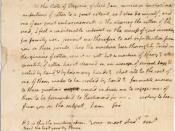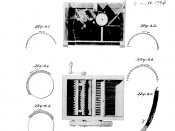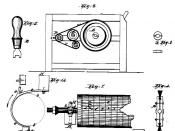Eli Whitney Exposé
Many people believe that Eli Whitney was a credit to the Industrial Revolution when really; he stole other's ideas, passing them off as his own. People credit him because America was new as a country and it wanted to be remembered throughout history as doing something good for man kind and the history of industry. He was born in Westboro, Mass. on Dec. 8, 1765, and died on Jan. 8, 1825. Whitney went to Yale College and graduated in 1792.
The only invention the Eli Whitney actually came up with on his own was the Cotton Gin. He discovered that cotton could be separated from the stalk using a sort of a toothed comb. He made the first prototype for his revolutionary machine, the cotton gin. For every one pound of cotton that a slave could produce by hand, Eli Whitney's cotton gin could produce fifty.
By the early 1800s cotton production went from three thousand bales to seventy three thousand bales.
He went into debt and he accepted a contract from the US government to make 10,000 muskets. In that time, guns were all made by hand, and no two were the same. If your gun broke, you needed a new one. While making the 10,000 guns, he realized, just as others before him did, that one gun could be built, and all the parts could be replicated. So instead of buying a new gun to replace the broken one, just the broken part could be replaced. Most people think that Whitney invented the concept of interchangeable parts, but he really didn't. German clock makers made some clock parts interchangeable in the 18th century.
Whitney was also credited to the invention of the concept of the assembly line when he really ripped off the idea...


